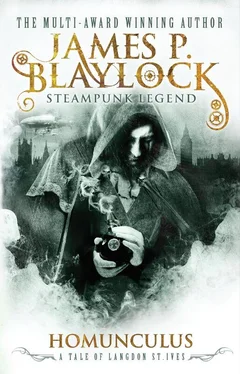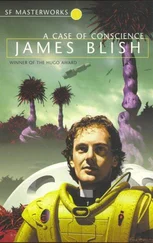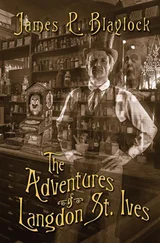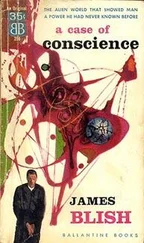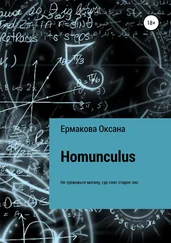James Blaylock - Homunculus
Здесь есть возможность читать онлайн «James Blaylock - Homunculus» весь текст электронной книги совершенно бесплатно (целиком полную версию без сокращений). В некоторых случаях можно слушать аудио, скачать через торрент в формате fb2 и присутствует краткое содержание. Жанр: sf_stimpank, на английском языке. Описание произведения, (предисловие) а так же отзывы посетителей доступны на портале библиотеки ЛибКат.
- Название:Homunculus
- Автор:
- Жанр:
- Год:неизвестен
- ISBN:нет данных
- Рейтинг книги:5 / 5. Голосов: 1
-
Избранное:Добавить в избранное
- Отзывы:
-
Ваша оценка:
- 100
- 1
- 2
- 3
- 4
- 5
Homunculus: краткое содержание, описание и аннотация
Предлагаем к чтению аннотацию, описание, краткое содержание или предисловие (зависит от того, что написал сам автор книги «Homunculus»). Если вы не нашли необходимую информацию о книге — напишите в комментариях, мы постараемся отыскать её.
Homunculus — читать онлайн бесплатно полную книгу (весь текст) целиком
Ниже представлен текст книги, разбитый по страницам. Система сохранения места последней прочитанной страницы, позволяет с удобством читать онлайн бесплатно книгу «Homunculus», без необходимости каждый раз заново искать на чём Вы остановились. Поставьте закладку, и сможете в любой момент перейти на страницу, на которой закончили чтение.
Интервал:
Закладка:
Pule grappled with it in an attempt to lever it further up out of the hole. The bottom of the coffin was wet in his hands, and his fingers smashed into clinging bits of mud and bugs. The coffin began to slide from his grasp, then gave suddenly with a sharp crack, the bottom boards splitting down the center and collapsing outward in a spray of debris, covering the face of the man in the hole. From the bottom of the coffin slid the gauze-wrapped corpse, rolling stiffly onto its side. Folds of rotten winding sheet ripped away to reveal long strands of webby hair standing away from a moldering face. Little pouchlets of flesh hung from cheekbones like fungus on a decayed tree. Ivory bone beneath shone faintly in the lamplight.
Pule stood transfixed, holding in either hand shreds of the rotted boards. The man in the open grave appeared to be strangling. His face, twisted away from the gaping countenance of the corpse, seemed about to burst. With monumental resolve, he twisted from beneath the ghastly remains, edged sideways a few precious inches, and very slowly and deliberately hoisted himself out of the hole. Then he walked calmly and stiffly away toward the lighted crypts, disappearing finally in the fog.
Pule stifled an urge to shout at him and another to shout for Narbondo. He unrolled a tarpaulin onto the ground, set his teeth, climbed into the hole and grasped the shrouded skeleton round its arms. He hauled it out and onto the canvas, folding the cloth around it, then set out toward the road, abandoning the light and dragging the tarpaulin across the wet grass, bumping over graves. The yawning black rectangle behind him vanished in mists through which glowed for a time the diffused yellow light of the veiled lantern.
Bill Kraken awoke to find himself in a strange bed. There was no confusion about it. He didn’t for a moment believe himself to be in his own shabby room. He felt pleasantly elevated, as if he were floating inches above the bed, and he heard a rushing sound in his ears that reminded him of a cold night he’d spent one early spring in a riverside cannery in Limehouse. But he wasn’t in Limehouse. And he was quite pleasantly warm beneath a feather comforter the likes of which he hadn’t seen for upward of fifteen years.
His head felt enormous. He touched his forehead and discovered that it was wrapped like the head of an Egyptian mummy. And there was a dull ache in his chest, as if he’d been kicked by a horse. On a little table beside the bed lay a familiar book. He recognized the tattered ocher binding, a long fragment of which was curled back onto itself, as if someone had the nervous habit of rolling it between thumb and forefinger while reading. It was the Account of London Philosophers by William Ashbless. He picked it up happily and squinted at the cover. Dead in the center, as if it had been measured out, gaped a hole as round as the end of a finger. He opened the book, and page by page followed the little cavity down to a conical lead slug, its nose just touching the one hundred and eightieth page, stopping short of aerating a treatise on poetics. Kraken read half a page. It separated mankind into two opposing camps, like armies set to do battle — the poets, or wits, on the one side, and the men of action, or half wits, on the other. Kraken wasn’t certain that the philosophy was sound, but the refusal of the bullet to damage the page seemed to signify he would have to study it further.
He knew, in a sudden rush, what bullet it was imbedded in the book. It was a miracle, the unmistakable finger of God. His peapot was gone along with his livelihood. He was sick of peapots anyway. He’d rather go back to hawking squids. If you were beaten in the head with a squid it didn’t amount to so very much.
He was startled by a noise from somewhere else in the house. Through a half-open door he could see a second room, aglow with gaslight. A shadow appeared and disappeared on the wall, as if someone had stood up, perhaps from a chair, had gestured widely, and had sat back down or moved away from the lamp. The shadow belonged to a woman. There was her voice. Kraken had little interest in the woman’s concerns, beyond a curiosity about the identity of his benefactors. A man spoke. Another shadow appeared, shrinking against the whitewashed wall, sharpening. A shoulder thrust into view, followed by a head — the head of Captain Powers. That explained the clay pipes, tobacco pouch, and matches next to the volume of Ashbless. The darkness beyond his window was Jermyn Street. He’d been saved by Captain Powers. And, of course, by the collected London Philosophers.
There was a sobbing in the room beyond. “I cannot!” the woman cried. The sobbing resumed. Captain Powers said nothing for moments. Then the weeping fell off, and his voice interrupted the silence. “The Indies.” Kraken heard only a fragment. “St. Ives is all right.” Mumbling ensued. Then, in a sudden, impassioned tone, almost shouted, came the words, “Let them try!” The woman’s shadow reappeared and embraced the shadow of the Captain. Kraken picked up Ashbless and leafed through it idly, peeking up over the top of the spine.
Again the Captain hove into view, following his shadow, stumping along on his wooden leg. He fiddled with the latch of a sea chest that lay against the wall, then swung the chest open and began to haul out odds and ends: a brass spyglass, a sextant, a pair of sabers bound together with leather thongs, a carved rosewood idol, the ivory head of a pig. Then out came a false bottom built of oak plank, as if it were a piece of the floor that lay below the chest. Kraken started. Perhaps it was a piece of the floor. The Captain bent at the waist, and the top half of him disappeared into the box, his left hand steadying himself on the edge, his right hand groping downward. He straightened again. In his hand was a wooden box, very smooth and painted over with pictures of some sort. It was too distant and too much in shadow for Kraken to make it out.
“Is it safe here?” asked the woman.
“I’ve kept it these long years, haven’t I?” said the Captain staunchly. “No one knows of its existence but you, now, do they? A few days, a week — and Jack will have it.” The Captain bent over the chest once again, hiding the box and replacing the oak plank. He very methodically slipped the odds and ends in atop it.
Kraken goggled in wonder. He felt like crying out, but doing so would be a dangerous business. There were vast secrets afloat. He was a small fish in very deep waters — almost a dead small fish. He lay Ashbless back onto the table, pulled the bedclothes up around his chin, and closed his eyes. He was tired, and his head ached awfully. When he awoke, sun played in through the sheer curtains beside his head, and the Captain sat beside him, quietly smoking a pipe.
Wind whistled beyond the casement while St. Ives squinted into the little cheval glass atop his nightstand. The previous day’s sun had, apparently, been blown out of sight, and the wind whipped the branch of a Chinese elm against the window as if the branch were rushing at him, enraged that it couldn’t get into the room and warm itself at the fire. It was a disgraceful way to treat the scattering of green leaves that had just that week poked out in search of spring, only to find themselves flayed to bits by unfriendly weather.
St. Ives dabbed more glue onto the back of the mustache. It wouldn’t do to have it blow off in a sudden gust. He worked his hair into a sort of willowy peak, and brushed his eyebrows upward to give himself the look of a disheveled simian, the same he’d worn the day before. Lord knew what the wind would do to it — heighten the effect, perhaps. He arose, pulled on a greatcoat, slipped Owlesby’s manuscript under the carpet, picked up the newly repaired clock, and stepped out into the hall. He paused, thinking, and went back into the room. There was no use calling attention to the manuscript — better to make it seem trivial. He yanked it out from under the rug and set it atop the nightstand, shuffling the papers and laying his book and pipe atop them for good measure.
Читать дальшеИнтервал:
Закладка:
Похожие книги на «Homunculus»
Представляем Вашему вниманию похожие книги на «Homunculus» списком для выбора. Мы отобрали схожую по названию и смыслу литературу в надежде предоставить читателям больше вариантов отыскать новые, интересные, ещё непрочитанные произведения.
Обсуждение, отзывы о книге «Homunculus» и просто собственные мнения читателей. Оставьте ваши комментарии, напишите, что Вы думаете о произведении, его смысле или главных героях. Укажите что конкретно понравилось, а что нет, и почему Вы так считаете.
